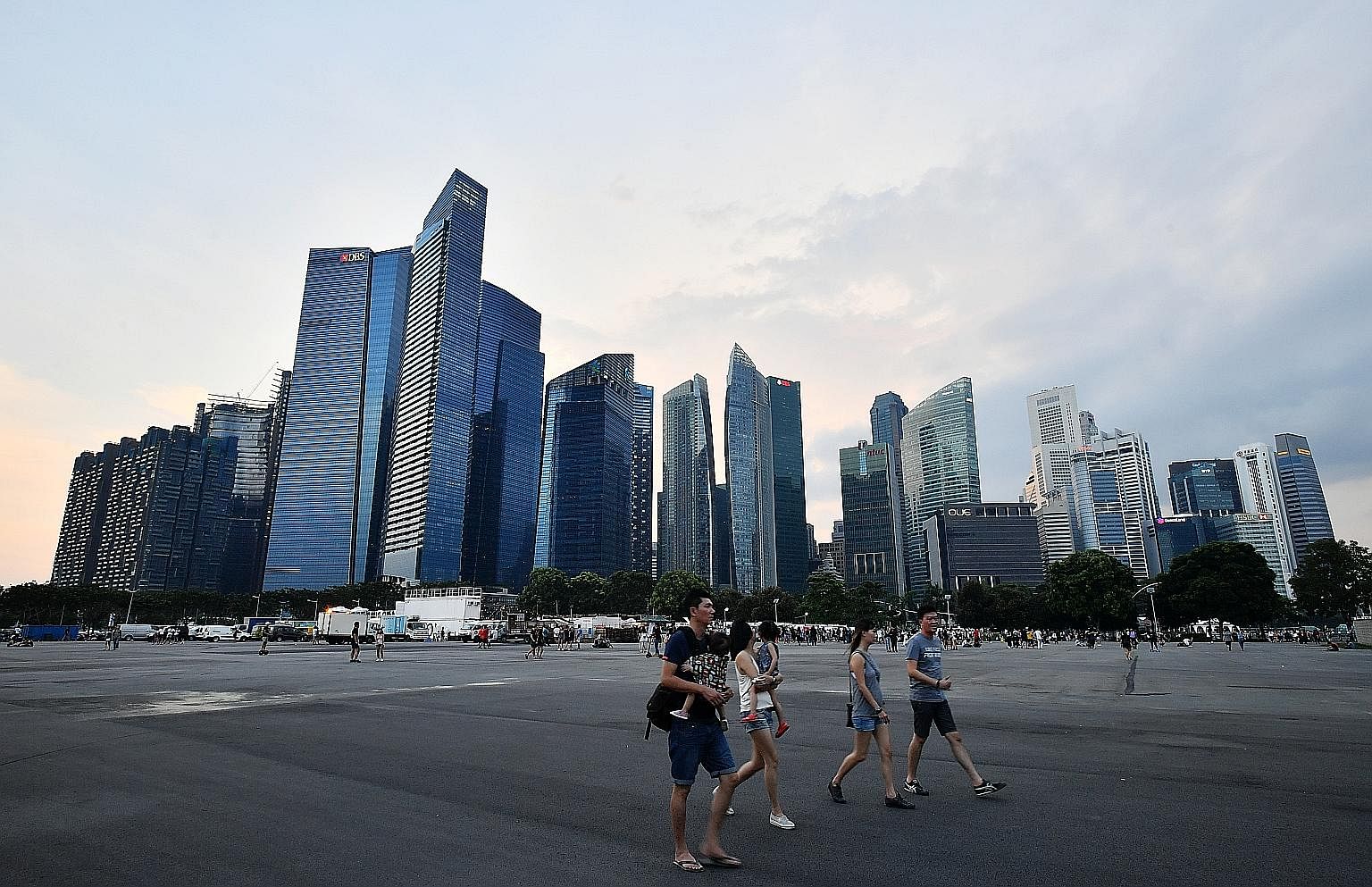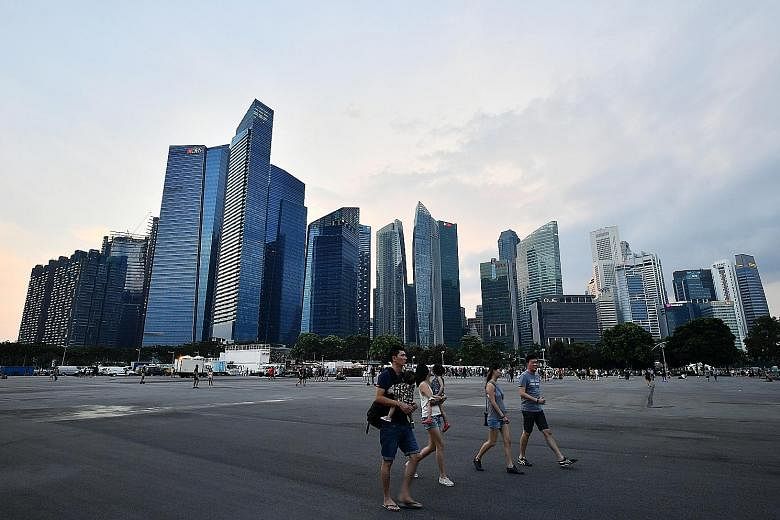Singapore has been buffeted by a string of unexpected global developments in recent months - raising questions about prospects for the Republic's small, open economy.
The outlook has stabilised since the start of the year but a host of uncertainties are still looming on the horizon.
The Straits Times looks at some recent key events with potentially significant repercussions for the global outlook and examines their impact on the Singapore economy.
BREXIT
Britain's shock vote on June 23 last year to leave the European Union (EU) has so far generated more uncertainty than actual disruption to the global economic and political environments.
Britain has started the process of negotiating its exit from the EU, but since there is no precedent, it is unclear how the Brexit process will work and what the outcome will be.
The uncertainty deepened when Prime Minister Theresa May weakened her hand after a much-closer-than-expected snap election on June 8 - that she had intended to strengthen her negotiating position with the EU.
Britain is scheduled to leave in March 2019. An extension can be granted if all EU members agree.

Uncertainties over Brexit have played out largely in the currency markets.
The pound, which had already taken a battering in the wake of the Brexit vote, fell sharply against major currencies last month after the British election delivered no clear winner.
-
About The Big Quiz

Each Monday, the paper's journalists will address burning questions in the Opinion section, offering unique Singaporean perspectives on complex issues.
These primers form part of the outreach of The Straits Times- Ministry of Education National Current Affairs Quiz, or The Big Quiz, which aims to promote an understanding of local and global issues among pre-university students.
Underpinning this year's quiz is a focus on disruption, a timely issue as various sectors and industries adapt to this global change.
The theme was featured in six campus talks helmed by editors and correspondents.
Six quiz rounds were also held for students to demonstrate their current affairs knowledge.
The six winning schools were Anglo-Chinese Junior College, Meridian Junior College, Nanyang Junior College, Dunman High School, Hwa Chong Institution and Pioneer Junior College.
The nationwide event is jointly organised by The Straits Times and the Ministry of Education, with the Singapore Press Holdings Foundation as its presenting sponsor.
•For more information or to view additional resources, go to https://www.straitstimes.com/tags/the-big-quiz
• For more information related to the topic, go to http://str.sg/4ar6
Currency fluctuations aside, economists largely believe Singapore and the rest of Asean will remain relatively insulated from the effects of Brexit, as most regional economies do not have significant trade exposure to Britain.
Britain is only No. 22 on the list of Singapore's trading partners. Non-oil domestic exports to Britain account for less than 1 per cent of the Republic's total shipments, while imports from Britain make up about 2 per cent of Singapore's total imports.
But Singapore companies with a presence in Britain, or those which use it as a gateway to the vast European single market, could be hurt if Brexit terms are unfavourable.
There are also wider concerns about the EU's long-term future and whether more European countries might decide to follow in Britain's footsteps and leave the grouping.
This would be detrimental to the global economy, including Singapore's. The EU is the Republic's second-largest trading partner after China.
US PRESIDENT DONALD TRUMP AND TRANS-PACIFIC PARTNERSHIP
The Brexit referendum outcome seemed to mark a shift in global attitudes in favour of populism and protectionism - a shift driven home by Mr Trump's rhetoric on the campaign trail and his eventual election as the 45th president of the United States.
The President-elect and businessman outlined an isolationist agenda during his campaign, casting doubt over the future of US foreign policy and trade relations.
For instance, he claimed that countries such as Singapore, China, India and Mexico were stealing jobs from Americans and vowed to stop the "job-killing" Trans-Pacific Partnership (TPP).
He put that promise into practice in January, signing an executive order ending US participation in the TPP, a free trade pact signed by 12 countries - including Singapore - that together account for 40 per cent of world trade.
The remaining signatories have agreed to move the trade deal forward without the US.
The 11 countries remaining in the trade agreement are : Singapore, Japan, Australia, Canada, Brunei, Chile, Mexico, New Zealand, Malaysia, Peru and Vietnam.
Singapore already has a bilateral free trade pact with the US - as well as with all of the other TPP countries, except Canada and Mexico - so Mr Trump's decision is unlikely to have significant impact on actual Singapore-US trade volumes.
The US is Singapore's third- largest trading partner, with total bilateral trade of over $75 billion in 2015.
The TPP is seriously weakened without the huge US market, which accounted for 60 per cent of the economies covered by the pact and was a major reason some countries decided to join the deal.
Still, it remains to be seen how the remaining TPP countries will decide to move the deal forward.
TERROR ATTACKS
The scourge of terrorism has risen in worrying intensity and proximity to Singapore, with the threat now at its highest level in recent years.
Terror attacks have occurred all over the world - in the Philippines, Kuala Lumpur, Jakarta, Melbourne, Sydney, Paris and London.
Terror incidents jumped threefold from about 5,000 in 2011 to nearly 17,000 in 2014. In contrast, the figure in 2000 was around 1,800.
Singapore has been identified by supporters of the Islamic State in Iraq and Syria (ISIS) terror group as part of its "East Asia wilayah" or state.
The others are Malaysia, Indonesia, the Philippines, southern Thailand, Myanmar and Japan.
The rise of ISIS-linked terrorists fighting in the Philippine city of Marawi is a worrying sign of the threat getting closer to home, Defence Minister Ng Eng Hen has said.
Self-radicalised individuals also pose a growing threat. Last month, two Singaporean auxiliary police officers were arrested for terrorism-related offences under the Internal Security Act.
Second Minister for Home Affairs Desmond Lee has also revealed in Parliament that two maids who were radicalised have been detected here in recent months, bringing the total number of such cases since 2015 to nine.
The Singapore authorities have been working on the basis of "when, rather than if" a terror attack will occur.
This means trying to make sure Singapore is as well prepared as possible so the economy, as well as society as a whole, can remain resilient in the aftermath.

Have a burning question related to this week's Primer topic?
E-mail us at askST@sph.com.sg
For more information, go to www.straitstimes.com/askST


